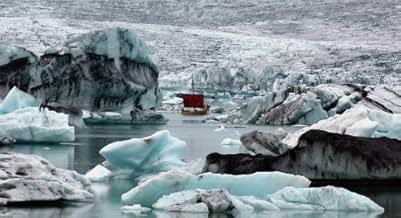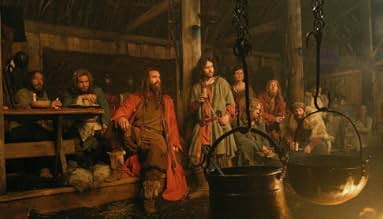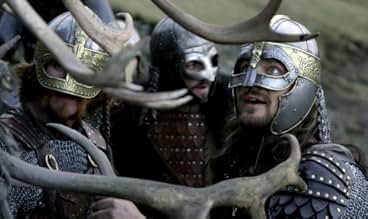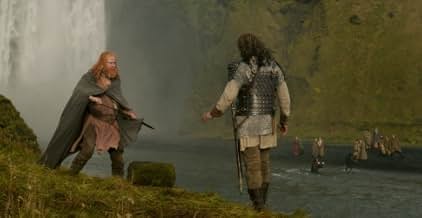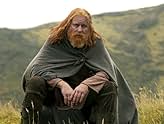In Dänemark töten der dänische König Hrothgar und seine Krieger im 6. Jahrhundert einen Troll, dessen Sohn Grendel Rache schwört.In Dänemark töten der dänische König Hrothgar und seine Krieger im 6. Jahrhundert einen Troll, dessen Sohn Grendel Rache schwört.In Dänemark töten der dänische König Hrothgar und seine Krieger im 6. Jahrhundert einen Troll, dessen Sohn Grendel Rache schwört.
- Regie
- Drehbuch
- Hauptbesetzung
- Auszeichnungen
- 1 Gewinn & 6 Nominierungen insgesamt
- Grendel
- (as Ingvar E. Sigurdsson)
- Wealtheow
- (as Steinunn Ólína Thorsteinsdóttir)
- Erik
- (as Gísli Örn Gardarsson)
Empfohlene Bewertungen
Let me first say that Grendel engaged me throughout the movie. There were good performances by many of the cast (Butler's conflicted hero, Skarsgard's noble-but-not-so-noble king) , but Ingvar Sigurdsson owned it as Grendel. Was it the skill of the writer and director in making Grendel a vulnerable human(?) and victim (drawing a sympathy vote from the audience)? Was it Ingvar Sigurdsson's acting skills to express intense emotions and engage the audience despite virtually any words in the script and enough prosthetic make-up to impede facial expressions? All I know is that I connected with Grendel's pain. And isn't that the point?
Another prominent character was the weather. It wasn't on the casting list, but it showed up nonetheless and fought for top billing. It helped to draw you into the ruggedness of the times and the story, but I also found it distracting. Perhaps it's my own distractibility, but for whatever reason, the scenery and weather engaged me more than the story a few times.
The soundtrack was indeed beautiful, but personally, I don't think it fit. To me, the campfire-to-mead-hall timeless folktale would have been better served by a more primitive collection of instruments rather than the majestic orchestra suited to an epic. But that's just my taste.
My main criticism is that to me, the film seemed choppy. I felt like I missed out on some important parts. (I didn't take any washroom breaks, did I?) It may have been the editing. There are others who enjoyed the film much better at the second viewing, so maybe it's all there in the movie beyond my distraction by the scenery and Gerard Butler's rugged good looks. Maybe the movie did its job; after all I'm still chewing on it 2 weeks later. Who knows? I did, however, catch the humor in the film. Andrew Rai Berzins' sharp wit and humor came to the rescue and drew me back in when distractions prevailed.
I'd really like to see it a second time now that my giddiness is over. I was anticipating this movie from the time filming began, and what film can live up to a year's worth of my ruminations and expectations? Now, don't ask me to rate the film with a number. I hate numbers. They don't mean anything. You should never see a movie based on numbers. See it because you want to.
and if my review left you with more questions than answers, then I've done my job, because that's where the movie left me. Now go see the movie and find your own questions and answers.
If this had been the result of real artistic vision, it might have worked, but it wasn't; it was done by the book, in a Sensitivity 101 fashion, and inconsistently, so that the result wasn't either mythic or modern. Or not the way the film-makers hoped, anyway. Instead of being a synthesis, it was an uneasy mix.
Oh, it was moderately entertaining to a modern man and woman, the scenery was magnificent and the cinematography splendid - almost a given, these days. The acting, with one important exception, was very good. I'm glad I saw that and not... what was the other one? Snow dogs in Peril? Oh, 'Eight Below'. 'Beowulf and Grendel' was actually about something, and not just 'based on actual events' - the usual witless excuse for a dull and meandering story.
What was Beowulf about? Originally - think about this - the tellers and hearers of this tale lived the dullest and most dangerous existence possible. They were pioneers, always on the jagged edge of starvation, faced with endless toil and unremitting vigilance, just to survive against an unremittingly hostile environment. They must have longed for a single villain, an enemy they could strike at and defeat, once and for all. Thus, Grendel. Grendel is all their fear and drudgery rolled into one. And Beowulf. He is them, all rolled into one, their collective courage and strength.
It might be possible to adapt this to modern ideals, but it has to be re-imagined, which likely means changing time and place to, let's say, the recent old-west, the populace to sodbusters, the Grendel-menace to an unbeatable black-hat gunslinger and the hero to the man in buckskin. You can't just graft modern attitudes onto ancient warriors and pretend you've done something new and significant.
The addition of the witch, Selma, played by my countrywoman Sarah Polley, is the worst of the modernist grafts. She plays the part almost without affect, as if all her actions were the product of cool rational thought, and didn't matter very much, anyway. I picture the director ranting at her in Icelandic, while a very polite translator murmurs, "more intense, please". I hate to bad-mouth one of the more intelligent actresses of our time, and one most loyal to her Canadian Roots, but she really dropped the ball on this one, and it affects the whole movie's credibility. If she'd been crazier, dirtier, more savage, more a part of the threatening Other, the role might have worked. Since she chose to preserve the proprieties of a modern girl --don't flip out, even when a troll is ravishing you -- she sinks the whole enterprise.
Final comment: handsome, amusing, entertaining, but highly flawed.
Beowulf & Grendel owes as much to John Gardner's Grendel as it does to the Beowulf epic. The roles of Hero and Monster do not so much embody intrinsic Good and Evil as reflect qualities attributed to their assigned archetypes. How and why we assign those roles is at the heart of the first-ever serious adaptation of the anonymous poem. The movie systematically leads us through a labyrinth of History, Cultures, the psycho-social reaction to Outsiders and the unfortunate results of those actions to the inescapable conclusion that we are not so different from one another. The ensuing Logic would then dictate that War is merely a lazy solution to a problem better addressed by examining our own psyches.
Beowulf is portrayed with astonishing depth by the Scottish actor, Gerard Butler, who is accumulating an impressive array of credits from Attila (the highest-rated U.S. mini-series) to Phantom of the Opera (the lavish 2005 Musical) to Dear Frankie (the award-winning independent Scottish film), to name a few. As always, he throws himself whole-heartedly, thoughtfully, and more important, believably, into the role of Hero, which in less-capable hands might be one-dimensional. Even the screenwriter, Andrew Berzins, was both surprised and impressed by the levels to which Mr. Butler plumbed the character "all in his facial expressions." Rising above his mastery of brooding good looks through tangled locks of hair, he manages to have us look through his eyes, rather than at his eyes - no mean feat for someone who is undeniably easy on the eyes! Beowulf emerges as the antithesis of the later Danish Prince, Hamlet, who is so introspective that he is paralyzed into inaction. In contrast, Beowulf willingly accepts the yoke of the traditional Hero and initially and immediately acts without thinking. He recognizes his Destiny in this life and beyond, stating, "I'll go where I'm sent!" He does not, however, stop there. Delving into the reasons behind his mission, he becomes a relentless, if uneasy, historical detective, needing to unearth the cause of the troll/monster Grendel's savagery.
The Hero's journey, punctuated by pre-destined acts of violence, is one in which we participate and evolve along with Beowulf, with the assistance of the witch, Selma (appropriately ambiguously played by the popular Canadian actress, Sarah Polley). Although she and Beowulf do pair off at one point, theirs is not really a romantic connection. She serves as a sort of conduit between Beowulf and Grendel, leveling the playing field between them.
Grendel is splendidly brought to heartbreaking life by Iceland's biggest Star, Ingvar Sigurdsson. Interestingly, his 4-year-old son makes a very credible acting debut as the young Grendel, orphaned in no uncertain terms at the start of the movie and laying the foundation for the carnage to come. Harking more to Gardner's Grendel than the unremittingly bloodthirsty troll of the original poem, Mr. Sigurdsson manages to express both the innocence and tragedy of Grendel with gusto, exploring his un-human characteristics without judgment. It is a tribute to his talent that rather than being horrified by a scene in which we see Grendel bowling with victims' severed heads, we identify with the spirit of pure Joy breaking through a monster's lonely existence.
Providing a context for the Hero/Monster mythos is a superb cast of supporting characters. Stellan Skarsgard is the alcoholic Danish king Hrothgar, not only unwilling to accept responsibility for the scourge of Grendel, but not even wanting to consider "why a f***ing troll does what a f***ing troll does." Eddie Marsden plays the foaming-at-the-mouth crazed Irish Catholic priest, Brendan, heralding the advent of Christianity and the desire of a people to unburden themselves of any and all accountability for their actions. And Ronan Vibert embodies the equivalent of modern day mass media as the Bard, Thorkel, through whom the saga is transformed (over Beowulf's objections) into a revisionist history which does not bear close examination. As Martin Delaney notes as the young warrior, Thorfinn, what we are left with are "tales of sh*t." The old Beowulf is not gone. The tone of the original oral tradition is maintained by Berzins' strict adherence to Anglo-Saxon and Norse root words and an ongoing thread of bawdy humor against a relentless musical score rife with tribal drums. The comic relief serves, as in Shakespeare's tragedies, to lighten and make palatable the raw impact of some harsh realities revealed. But a new Beowulf & Grendel rises from the ashes. This blood and guts epic, with its undeniably spiritual undercurrent, balances swordplay with word play, and the audience is left to draw their own conclusions in the bloody aftermath. The tag line, "Heads will roll!" refers not only to the blood-soaked battle scenes, but to the thought processes set in motion that will leave you re-evaluating concepts of and motives behind Love, Loyalty, and War long after you leave the theater.
Anglo-Saxon poetry is alliterative, haunting, sad, and in a language utterly unlike modern English, completely strange. Here's how the poem begins, with translations for each line.
(You will have to look elsewhere, because the format of this website does not allow foreign languages.)
Which has been translated:
LO, praise of the prowess of people-kings of spear-armed Danes, in days long sped, we have heard, and what honor the athelings won! Oft Scyld the Scefing from squadroned foes, from many a tribe, the mead-bench tore, awing the earls. Since erst he lay friendless, a foundling, fate repaid him: for he waxed under welkin, in wealth he throve, till before him the folk, both far and near, who house by the whale-path, heard his mandate, gave him gifts: a good king he!
Along comes a movie, which doesn't have much US distribution but is currently showing in New York (July 2006). And I'm told there was a version with Christopher Lambert, but I have not seen it.
There are many translations but one by a poet of distinction recently done is that of the Irish poet Seamus Heaney. Here are a couple of short passages from Heaney's version:
You have won renown: you are known to all men far and near, now and forever. Your sway is wide as the wind's
It is always better to avenge dear ones than to indulge in mourning. For every one of us, living in this world means waiting for our end. Let whoever can win glory before death. When a warrior is gone, That will be his best and only bulwark.
This atmosphere that comes in the poem, even from a few lines, the importance of fame, of reputation, a deep fatalism, a sense of the power of nature and overwhelming sadness, are typical of Beowulf and of Anglo-Saxon poetry. But whether you get any of that from the movie I don't know.
What you do get is plenty of cussing, of F-words and S-words, spoken even by King Hrothgar and Beowulf himself, and body functions, and sexual intercourse with a monster, who, for reasons best known to the filmmakers, is referred to as a "troll." Perhaps in Iceland a "troll" can be a giant, but in English the word has more often been used for a dwarf. Grendel isn't a dwarf. In the poem you don't see him clearly. He has scales. He's a monster. In the movie he's a big man who babbles incomprehensibly and has big muscles. He's like the Hulk.
It's rather unfortunate that Sarah Polley plays a witch, one who has intercourse literally with both troll and man. Everybody else has some sort of rustic English accent, but she speaks mall American. That doesn't work, and neither does her presence.
In the time of the Angles and the Saxons, the mead hall was a place for carousing, but also a semi holy place. Men got drunk and swore oaths, which they were bound to for life. The mead hall scenes are huge in Beowulf, but they just look like moments from any minor historical mélange here in this movie. Hrothgar's hall's structure is realistically represented from the outside, though.
The snowy Icelandic landscape has an austere beauty that is one of the best things about this movie.
Ingvar Sigurdsson as Grendel is impressive; but it would still be more evocative of the story and the poem not to see him clearly. Gerard Butler is dashing as Beowulf. But the way he talks! Stellan Skarsgård as King Hrothgar appears very beaten down; in the poem he is, indeed, depressed and presumably drunken, but somehow that is nobler in the mind than on the screen.
Whereas there's a lot of history -- epics are repositories of history -- in Beowulf the poem, in the movie things and people aren't explained very much. You get a rough idea, but explanation is almost totally omitted, even though every once in a while somebody in a boat speaks a few lines of poetry carrying the story forwrd.
The music by Hilmar Örn Hilmarsson is astonishing and powerful, though it isn't the sad, slow music of the Anglos-Saxon poem. This is of course an action movie. But there isn't quite enough action. It made me think of the wonderful example of dramatic narrative on film, which is so succinct and gripping and atmospheric, and which evokes an archaic time among Scandanavian peoples: Nils Gaup's 1987 Pathfinder/Ofelas, a Norwegian-Finnish production shot in the snow. Smashing. Find it and watch it.
Wusstest du schon
- WissenswertesIn 1731, the original manuscript that the movie is based on was severely damaged by fire, along with several other medieval writings, in London UK.
- PatzerWhile the Daneland portrayed in the movie has many mountains, cliffs and rocks, the real Denmark does not. Denmark has no rock formations, and very few steep cliffs.
- Zitate
Beowulf: Has this thing, this troll, killed any children?
King Hrothgar: No.
Beowulf: Women?
[Hrothgar shakes his head]
Beowulf: Old men?
King Hrothgar: What are you saying? That he fights with a clean heart? He kills the strongest first. He shows us he can kill the strongest. Who cares if he spares the children? They'll die anyway without fathers.
Beowulf: My wits still war with how this all began.
King Hrothgar: Hate for the mead hall. I can only guess. The night we finished it the foul creep came.
Beowulf: So, nothing was done to the troll itself?
King Hrothgar: Oh, Beowulf, it's a fucking troll! Maybe someone looked at it the wrong way.
Beowulf: Some Dane?
King Hrothgar: ...I never begged anyone to come here. Take on our fight. I don't hold you here.
Beowulf: I know you don't.
King Hrothgar: Then don't sour my heart with talk about why a troll does what a fucking troll does!
- VerbindungenFeatured in Wrath of Gods (2006)
Top-Auswahl
- How long is Beowulf & Grendel?Powered by Alexa
Details
- Erscheinungsdatum
- Herkunftsländer
- Offizieller Standort
- Sprachen
- Auch bekannt als
- Beowulf ve Grendel
- Drehorte
- Produktionsfirmen
- Weitere beteiligte Unternehmen bei IMDbPro anzeigen
Box Office
- Bruttoertrag in den USA und Kanada
- 68.820 $
- Eröffnungswochenende in den USA und in Kanada
- 4.360 $
- 18. Juni 2006
- Weltweiter Bruttoertrag
- 92.076 $
- Laufzeit
- 1 Std. 44 Min.(104 min)
- Farbe
- Sound-Mix
- Seitenverhältnis
- 1.78 : 1(original negative)
- 2.35 : 1


